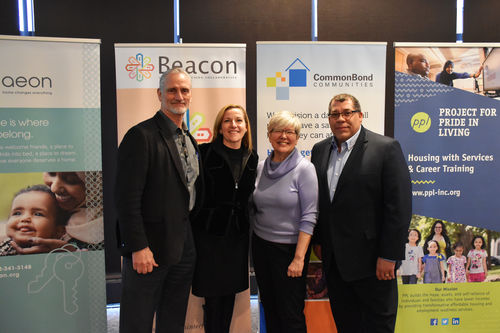The cycle of housing instability and incarceration is well-documented and well-known. Systemic barriers and the challenges of homelessness increase the risk of re-offending.
Together with Aeon, Beacon Interfaith Housing Collaborative, and CommonBond Communities, we formed a Research Collaborative in 2016 that questioned how we could disrupt this cycle and make our housing more inclusive.
By joining forces and data, we conducted a first-of-its-kind study with Wilder Research to learn more about the relationship between criminal history and success in housing.
The Collaborative announced three key findings of the study:
- 11 of the 15 criminal offense categories studied had no statistically significant effect on housing outcomes after controlling for other observable factors.
- Second, the effect of a prior criminal conviction on a resident’s housing outcome declines over time and becomes insignificant. Criminal convictions that occurred more than 5 years prior to move-in have no significant effect on housing outcomes.
- Third, for criminal convictions that may impact housing success, the increased risk of a negative housing outcome was 3 to 9 percentage points at most. Other household characteristics, such as size of household, are at least as important as criminal background in determining housing outcomes.
This study was the first of its kind that examined whether a more data-driven approach to making decisions on restrictions tied to criminal backgrounds would create more opportunities for people to find suitable housing. Accessing and maintaining quality, affordable housing has a demonstrable impact on family stability, the life outcomes of children, and overall community well-being.

